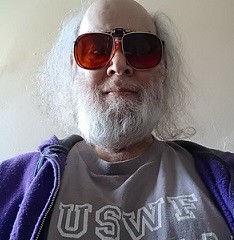Wednesday, September 26, 2018
Anthony Joshua and the Elusive Quest for Greatness
by Eddie Goldman
In the excruciatingly extended, contrived, and boring soap opera about the alleged negotiations to sign a fight to crown a new undisputed heavyweight champion of the world, what is largely being lost is just who the leading candidate is and how and why he got there.
The consensus top heavyweight is, of course, Anthony Joshua of the U.K., who turns 29 on October 15. With a stellar record of 22-0 and 21 KOs, he holds three of boxing's major sham sanctioning body heavyweight world titles. He also was a 2012 Olympic gold medalist boxing in the super heavyweight division.
Joshua first came to major international attention in 2011 at the 2011 AIBA World Boxing Championships in Baku, Azerbaijan, amateur boxing's highest level tournament, in which he entered as an unseeded fighter. He had only been boxing for a few years, which included some run-ins with the cops for criminal activity, and having to wear an electronic tag on his ankle in 2009. But success on the British and European amateur scene, plus not wanting to become yet another statistic, helped Joshua mature, clean up his act, and focus on his career as a boxer.
In the 2011 amateur worlds, Joshua surprised many by first making it to the quarterfinals where he faced 2004 Olympic bronze medalist and 2008 gold medalist and top seed Roberto Cammarelle of Italy. Joshua won by a score of 15-13, under AIBA's Bizarro points scoring system. After winning in the semis, the opponent in the finals for Joshua, just 22 years old, and just about three years into the sport, was 25-year-old Magomedrasul Majidov of the event's host country of Azerbaijan. Majidov, also making his amateur world debut, won a close contest by a score of 22-21. But unlike Joshua, Majidov has never turned pro, and as recently as 2017 won gold for the third time in the amateur worlds again.
In the 2012 London Olympics, Joshua again made it to the finals, and again faced the defending gold medalist Cammarelle, who was ten years older than Joshua at 32. After a sloppy first two rounds -- this still was amateur boxing, after all -- Joshua fell behind by a 13-10 score. But with a delirious partisan crowd cheering him on, Joshua came back in the third and final round, finding his range a little better and landing enough clean shots to even the score at 18-18. They then had to go to the count-back, meaning the total punches landed, which went to Joshua, 8-5. Anthony Joshua was the 2012 Olympic gold medalist boxer in the super heavyweight division.
The result of that final, however, drew some criticism, as many Olympic boxing matches do. On the U.S. telecast, boxer and broadcaster B.J. Flores previewed this fight by calling Joshua "a superstar in the making." But after the fight, he said Cammarelle deserved to win and "they gave it to the hometown guy again."
Nonetheless, it was Joshua who rose to international fame and soon announced that he would be turning pro. This was an incredible turnaround for Joshua, who as late as 2011 was busted for possession of herbal cannabis with intent to supply, was suspended from the British amateur team, and narrowly avoided jail time by accepting community service for a year. Roberto Cammarelle, by the way, stuck around the amateurs, where he took bronze in the 2013 amateur worlds, and has never boxed as a professional.
With all this adversity -- which is not that well-known among the non-British boxing world -- out of the way, Joshua joined up with Eddie Hearn's Matchroom Boxing in 2013. There a well-designed, deliberate, and step-by-step plan was carried out to develop Joshua into a professional world champion by about 2017 or so.
He started as a pro in 2013, fighting the usual suspects. By the end of 2014 Joshua was 10-0 with 10 KOs. In late 2014 and 2015 he took a step up and faced journeymen Matt Skelton, Konstantin Airich, Denis Bakhtov, Michael Sprott, Jason Gavern, Raphael Zumbano, and Kevin Johnson. He stopped them all. Then it was the unbeaten and popular Scottish local fighter Gary Cornish, a boxer not destined for greatness. He lasted just 1:37 of the first round. Joshua closed out 2015 with a seventh-round TKO over amateur rival and then-unbeaten pro Dillian Whyte, who had defeated Joshua back in 2009 in the amateurs. Whyte rocked Joshua in round two but did not score a knockdown. With another setback avoided, Joshua would thus capture the vacant British heavyweight title, and close out 2015 with a record of 15-0 and 15 KOs.
In early 2016, he became a beneficiary of a series of unlikely events which caused chaos in the heavyweight division. Tyson Fury's November 2015 points upset of then-unified heavyweight champion Wladimir Klitschko, a dreadful fight to be sure, triggered a contractual clause for an immediate rematch. But the IBF, one of whose sham titles Fury had won, forbade this, and summarily stripped Fury of this belt.
A fight for the vacant IBF belt took place in January 2016 between two unbeaten fighters, Vyacheslav Glazkov and Charles Martin, neither of whom were considered to be in the top tier of the division. After two uneventful rounds, the fight was more or less even, but in the third, Glazkov's right knee went out and he could not continue. Martin, unceremoniously and by default, was the winner and new IBF heavyweight champion. Glazkov, bu the way, has not fought since.
What this turn of events meant for Anthony Joshua, already working his way up these rankings, was an unexpectedly early graduation from the ranks of the good prospects to becoming a title challenger. A major belt was there to be had, and his management team cleverly got Joshua the fight. Martin never had a chance, lasting just two rounds, and in his 16th pro fight, Anthony Joshua was close to the top of the heavyweight division.
Next came Dominic Breazeale, who went down in seven, and Eric Molina, who only lasted three rounds, and at the close of 2016 Joshua was 18-0 with 18 KOs, with a strap around his waist way ahead of schedule.
Joshua's 19th fight has already gone down in boxing history as a heavyweight classic, and another turning point in his accelerating rise to top of the weight class. That was his April 2017 fight with Wladimir Klitschko, his first since losing to Fury, for the IBF and one of the WBA belts. Klitschko had been waiting around for the Fury rematch, which was put off twice, until Fury tested positive for PEDs, admitted using cocaine and binging on alcohol, ate himself up to about 400 pounds, and eventually relinquished the two major belts he had. Fury was suspended and lost his boxing license, so now that he was out of the picture for a while, the match that made the most sporting and business sense was Klitschko against Joshua.
As the world knows, Joshua knocked down Klitschko in round five, was himself knocked down and almost out in round six, but eventually recovered and came back to drop Klitschko twice in round 11 and then have the ref stop the beating, for a TKO win at 2:25 of that round. It is a fight that can be rewatched and rewatched, even when you know what ensued. It deservedly was widely recognized at the 2017 fight of the year. And in it, Joshua had once more demonstrated that even when down and almost out, he could get off the deck, overcome the adversity, and in the end triumph.
Now as unified champion and atop the heavyweight rankings, it almost seemed as if he had to slow down to catch his breath, if not physically then mentally. A tenth-round stoppage of late replacement and IBF mandatory Carlos Takam had him looking less than stellar, even disappointing. A March 2018 unification fight with unbeaten WBO champ Joseph Parker went the distance, the first time in Joshua's pro career. Joshua won and now had three major belts, but the fight had few fireworks and Joshua's knockout streak had ended, with his new record 21-0 with 20 KOs.
With all these belts came all their mandatories, deserved or not, at least until he or someone becomes accepted as undisputed heavyweight champion of the world and would not care if he were stripped for not facing them. So next up was one of those deserving mandatories, Russia's Alexander Povetkin, a 2004 Olympic gold medalist who entered his September 2018 bout with Joshua at 34-1 with 24 KOs. His only loss was a decision in 2013 to that same Wladimir Klitschko, meaning Povetkin had never been stopped.
When Joshua and Povetkin fought in London's rain-swept Wembley Stadium before some 80,000 or so fans, Joshua went in a huge favorite over the 39-year-old Povetkin. That, however, did not deter the veteran Povetkin.
Although Joshua had a substantial height and reach advantage over Povetkin, he opened the fight almost in a crouch, fighting small with his left hand low. Towards the end of a close first round, Povetkin scored what turned out to be his best shots of the fight, a left jab-right uppercut-left hook combination that wobbled Joshua and left his nose bleeding. From rounds two through five, Joshua had little effective offense against Povetkin and was fighting with his mouth open. The tide turned, however, in the sixth when, again facing adversity in the ring, Joshua started to let his hands go.
Scores of the fight through six rounds varied all over the place, with many impartial and seasoned observers having what was inarguably a close fight 58-56 for Povetkin or even at 57-57. The three official judges, though none of whom were from the U.K., laughably had it 59-55 and 58-56 twice, all for Joshua. But none of this ended up as anything other than footnotes in the seventh round.
Joshua finally landed one of his powerful right hands on Povetkin, who was visibly hurt. Next came the combinations punctuated by another right, which dropped Povetkin, who almost fell clean out of the ring. He somehow beat the count and arose, although looking as if he could be knocked back down by almost anyone or anything. He took a few more punches before being decked again, just as referee Steve Gray stopped the fight, with Povetkin's trainer frantically gesturing on the ring apron.
The official time of the stoppage was 1:59 of round seven, with another TKO victory upping Joshua's record to 22-0 with 21 KOs. The knockout streak had resumed, he had stopped an opponent who had never before been stopped in his previous 35 fights, and his belts had been retained, but Anthony Joshua had to dig deep once more and overcome what should have been a deficit on the scorecards in order to prevail.
In the postfight press conference, a calm Joshua matter-of factly-explained his view of what had happened.
"Just got to take your time," he said. "It's all about instinct what life is. We tend to lose it as you get older because we listen to the crowd, we listen to opinions, 'You're not quick enough, you're not this, you're not that.' But I believed in myself. I knew when the time was right. You could see the chink in their armor fading. I know he's strong to the head but weaker to the body. So I worked to the top, worked to the bottom, break him down, both ends. And then when the opportunity came, I saw and I just took it, really."
There are those who think that Anthony Joshua will always make good on his belief in himself, and those who insist he is still overrated, untested, and unworthy. But his last nine opponents had a combined record of 259-7-1 before he faced them, held numerous belts, and included two Olympic gold medalists and five who were unbeaten as pros. Of The Ring's latest heavyweight rankings, Joshua is number one and has already defeated four of the other nine. Along with the victory over Klitschko, which led to his retirement as a fighter, there is no other heavyweight active today whose resume even comes close to Joshua's.
But the time-tested and detestable tribalism and nationalism that have long been incorporated into boxing's modus operandi makes its adherents always dissatisfied when one not from their camp is atop the weight class. They tell us that Joshua hasn't yet fought in America, he can't take a punch, and, most dogmatically, he is afraid of Deontay Wilder, the WBC champ who holds the last piece of this undisputed heavyweight champion puzzle.
Yes, Joshua shows vulnerabilities, he can be hit, and even he admits that he is still learning on the job. But he and his management team say, convincingly, that he will eventually fight the winner of the Deontay Wilder-Tyson Fury bout, said to be scheduled for December 1, and maybe one day in the future the loser as well. He is close to cleaning out what is still not a particularly deep division, and he may accomplish this before his 30th birthday.
Before his fight with Wladimir Klitschko, and to the astonishment of some including even some British boxing writers, I said that Anthony Joshua had the potential to become as popular as Muhammad Ali. Now Joshua was named the most marketable athlete in the world in any sport by SportsPro Media in 2017, and number two in this category in 2018. He has drawn hundreds of thousands of fans in his last four fights, two in Wembley Stadium and two in Cardiff's Principality Stadium. He is the top draw on the U.K.'s pay-per-views on Sky Sports Box Office, and the DAZN streaming service timed its American kickoff to feature his fight with Povetkin. And his future plans include not only fights in America, but in Africa, especially because of his Nigerian heritage, and Asia and continental Europe. He has called himself a citizen of the world, and a world tour might be on tap if or when he becomes undisputed champion.
I will add that Anthony Joshua is well on his way to being Sonny Liston without the mob, Muhammad Ali without the Nation of Islam, and Mike Tyson without Don King. Joshua may yet lose along the way, as they all did, but history shows that he will quite likely recover and be the one standing at the end.
(Photo of Anthony Joshua and Alexander Povetkin from Matchroom Boxing.)
Labels: Alexander Povetkin, Anthony Joshua, boxing, Eddie Goldman, No Holds Barred
Comments:
Post a Comment
















